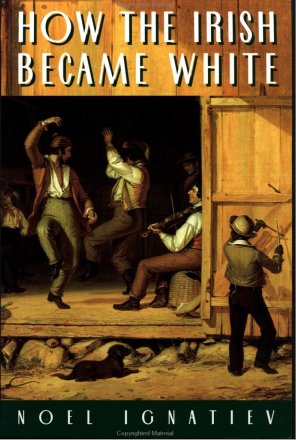How the Irish Became White
I am haunted by the human chimpanzees I saw along that hundred miles of horrible country…to see white chimpanzees is dreadful; if they were black one would not see it so much, but their skins, except where tanned by exposure, are as white as ours.
– Cambridge historian Charles Kingsley, letter to his wife from Ireland, 1860
RTE’s disastrous New Years Eve programme presented by Ryan Tubridy descended into a debacle involving George Hook, Brendan O’Connor and a woman whose name I didn’t catch. I switched off very quickly but did hear the contrarian BOC state that he didn’t have to be there and that he ‘has a life’ or ‘friends’ or some such. Why do I bring it up here – well, Ryan et al discussed the Global Recession/Depression and like much of the internet commentariat compared the coming years to the Great Depression of the Thirties – which was the nub of their cheery pre-midnight New Years banter.

But if you go a little further back things were much worse. That’s one of the reasons I’ve been enjoying the best Christmas gift I received – Noel Ignatiev’s ‘How the Irish Became White’. The book tells the story of ‘how the new Irish immigrants (to America) achieved acceptance among an initially hostile population only by proving that they could be more brutal in their oppression of African-Americans than the Nativists’. The oppression of the Irish at home and the endemic poverty on the Island is described in the earlier chapters in order to contextualize the later brutality. Here’s a snippet to put things in perspective…
From Chapter 2 – ‘White Negroes and Smoked Irish’
Throughout most of the 18th century, Ireland was governed…. (by) the Penal Laws. Under the terms of these Laws, Catholics were not permitted to vote or serve in Parliament or hold public office in any of the municipal corporations, or live within the limits of incorporated towns: they were forbidden to practice law or hold a post in military or civil service. Catholics were forbidden to open or teach in a school, serve as private tutors, attend university, or educate their sons abroad. They were forbidden to take part in the manufacture or sale of arms, newspapers, or books, or possess or carry arms. No Catholic might own a horse worth more than five pounds. Except in the linen trade, they might take on no more than two apprentices…. Might not rent land worth more than thirty shillings a year, nor lease land for longer than thirty one years, nor make a profit from land of more than one-third of the rent paid; no Catholic estate could be entailed but instead had to be divided at death among all the children. By converting to Protestantism a Catholic son could dispossess his father and disinherit all his brothers… All bishops of the Catholic Church were ordered to leave the country under pain of death if they remained or returned.
At least it’ll never get that bad again….
This entry was posted on Friday, January 2nd, 2009 at 1:09 pm. It is filed under History.
You can follow any responses to this entry through the RSS 2.0 feed.



